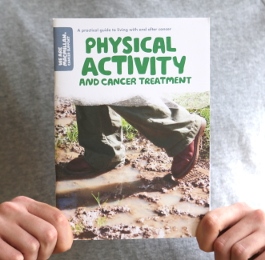Most of us know we should probably get more exercise, but it can be hard to find the time, motivation or energy. And if you're having or have had cancer treatment, this can be even harder and there may be other barriers too. For example, if you have fatigue, you may worry that physical activity will make it worse. Or maybe cancer's putting an extra strain on your finances and you think getting fit means spending money on exercise classes or a gym membership. Or maybe your doctor's advised you to avoid certain types of activity and you're not sure what else to try.
That's why we've put together our free Move more guide. It can help you find solutions to all these barriers and make physical activity a regular part of your life. In this blog, senior editor Tess explains what's in the guide.
Move more guide
The guide explains how to start doing more physical activity. It covers all the steps to becoming more active:
12-week activity diary and chart
Once you've read the Move more guide and worked out why you want to become more active and how you're going to do it, you can use the 12-week activity diary inside to record your goals, the activity you do and how it made you feel. Using the diary will also help you see whether the goals you’ve set are realistic.
The guide also includes an activity chart you, and your friends and family, can use to record your daily achievements. There’s a magnet you can use to stick the chart on your fridge. Keeping the chart somewhere you can see it every day can help remind you of your progress.
Activity flyers
The guide also includes five flyers about some popular types of activity:
The flyers show you that by doing everyday things like walking the dog or cleaning the bathroom, you're doing physical activity. And if there's a sport you enjoy doing or used to do, getting back into it could be a great way of getting more exercise. You don’t need to buy lots of new equipment or spend money on an expensive subscription. Physical activity means anything that gets you moving more, so all five of these things count!
Move more DVD
The DVD has an exercise programme designed specifically for people living with or after cancer. You can do the exercises at home. This means you can do them at a time that suits you and you don't need to pay for an exercise class at a gym. Each exercise has two or three different levels, so you can choose the level that’s right for your fitness level or how you’re feeling at the time.
The DVD also has advice about building up your levels of activity and setting goals. There’s also information about other ways to get active, including health walks.
Physical activity and cancer booklet

In the Move more guide there's also a booklet called Physical activity and cancer treatment. It explains the different benefits of doing physical activity before, during and after cancer treatment. It tells you if there are activities you should avoid due to your cancer type, the treatment you're having or any other conditions you have. The booklet also has information about the amount of activity you should aim to do. Most of us don't know how much or what types to do, but the infographic below shows the recommendations for adults in the UK.
There are some examples above of the types of activity you could do, but what if your favourite isn't in there? There's no single activity that's best for everyone. It's best to do a mix of aerobic, strength and/or balance exercises. And if you choose ones you enjoy, you're more likely to keep doing them. The table below shows some of the most popular activities and if they're aerobic, strength and/or balance exercises. The table below and the infographic above are both in the Physical activity and cancer treatment booklet.
So the Move more guide contains everything you need to get active. You can use it to plan what you're going to do, get started, stay on track, and keep physical activity a regular part of your life!
You can order a free copy of our Move more guide. You can also order the Physical activity and cancer treatment booklet on its own if you prefer.
To see what else Macmillan's cancer information team has been blogging about, please visit our blog home page! You can subscribe to receive our blogs by email or RSS too.
We're with you every step of the way
The Macmillan team is here to help. Our cancer support specialists can answer your questions, offer support, or simply listen if you need a chat. Call us free on 0808 808 00 00.
Comments? Feel free to add them below (you need to be logged in).
Keep in touch Follow Macmillan’s cancer information team on Twitter @mac_cancerinfo
Whatever cancer throws your way, we’re right there with you.
We’re here to provide physical, financial and emotional support.
© Macmillan Cancer Support 2026 © Macmillan Cancer Support, registered charity in England and Wales (261017), Scotland (SC039907) and the Isle of Man (604). Also operating in Northern Ireland. A company limited by guarantee, registered in England and Wales company number 2400969. Isle of Man company number 4694F. Registered office: 3rd Floor, Bronze Building, The Forge, 105 Sumner Street, London, SE1 9HZ. VAT no: 668265007